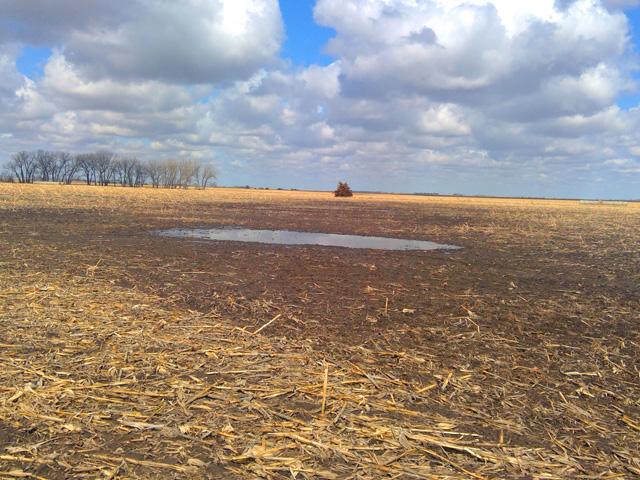USDA Motions to Dismiss Wetlands Case
USDA Argues It Never Took Final Action on South Dakota Farmer's Wetland Case
LINCOLN, Neb. (DTN) -- USDA asked a federal court to dismiss a wetlands lawsuit brought by Minor County, South Dakota, farmer Arlen Foster, in a filing this week with the U.S. District Court for the District of South Dakota.
Foster's lawsuit alleges the agency unlawfully refused to reconsider a wetlands determination when he presented new evidence in 2020 that may have proven the land in question was not a wetland.
For years, USDA has maintained that a puddle in the middle of one of Foster's fields is a wetland.
Attorneys for USDA said in their motion the court "lacks subject matter jurisdiction" on the lawsuit and "plaintiffs have otherwise failed to state a claim upon which relief may be granted." USDA requests dismissal or to issue summary judgement in favor of the government.
Summary judgment is entered by a court for one party and against another without a full trial. Summary judgments may be issued on the merits of an entire case or on discrete issues.
USDA attorneys said in a recent court filing Foster had not pursued all administrative remedies prior to filing the lawsuit.
Foster has been battling USDA's wetland determination on an 0.8-acre tract of land since 2008. USDA declared it a wetland in 2011 based on an agency process, and Foster convinced the Supreme Court to review the determination.
New evidence emerged in 2020 showing a tree belt installed on his farm by his father in 1936 is what has caused massive snow piles in the field. The yearly spring melt has created a perpetual puddle.
Foster presented the evidence to USDA in April 2020, but the agency declined to update its 2011 determination, which hasn't allowed him to farm the ground.
P[L1] D[0x0] M[300x250] OOP[F] ADUNIT[] T[]
In a memorandum in support of the motion to dismiss, USDA said it never took final agency action on Foster's case.
"The agency has not denied the requests," USDA said. "The agency has instead requested that plaintiffs clarify how their request conforms to the conditions imposed in the agency's regulations for obtaining such review. There is, thus, no 'final agency action' under the Administrative Procedure Act that would permit judicial review of the agency's response."
Attorneys for Foster said in court documents the agency "unlawfully withheld agency action" by not considering the new evidence.
"Claims alleging that an agency is unlawfully withholding action are not subject to exhaustion requirements," Foster's attorneys said in a discovery document.
"In any event, there is a final decision this court can review. It is the NRCS that makes the final decision whether or not to accept a request to review a previous wetlands delineation. That the NRCS makes the final decision to not review a request is reflected in the NRCS's August 2017 and May 2020 letters to the plaintiffs, which do not provide any appeal rights of the NRCS's determination."
Because of the determination that the field is a wetland, Foster would not be eligible for farm programs if he farmed the land.
The Pacific Legal Foundation is representing Foster. The foundation takes on cases that have the potential to set precedent in the Supreme Court.
According to the lawsuit, Foster's mud puddle does not dry out at the same pace as surrounding fields because it receives additional snow melt from the tree belt.
In about half of those years, the mud puddle dries out soon enough that its soil also is dry enough to support the use of farm equipment.
Foster's technical report to USDA in 2020 as part of a requested review of the 2011 certification demonstrates the mud puddle was created "incidentally to the development of the tree belt and is therefore an 'artificial wetland,'" the lawsuit said.
That information was not available to the Fosters or USDA ahead of the 2011 wetland certification.
Foster's lawsuit alleges the Swampbuster Act is unconstitutional because it "regulates every wetland in the United States of America, however small, however ephemeral, and however distant or unconnected from any other water body, so long as it is on a farm.
Foster previously argued unsuccessfully in court that the Natural Resources Conservation Service deprived him of his rights by deeming his land was similar to a known wetland 33 miles away.
In July 2008, Foster asked the NRCS to reconsider an earlier wetland delineation it performed, according to a petition he filed with the Supreme Court. Foster continued to challenge NRCS through a series of court cases, eventually losing in an appeal to the U.S. Court of Appeals for the Eighth Circuit in St. Louis in April 2016.
Read more on DTN:
"USDA Wants Court to End Wetlands Case," https://www.dtnpf.com/…
Todd Neeley can be reached at todd.neeley@dtn.com.
Follow him on Twitter @DTNeeley
(c) Copyright 2021 DTN, LLC. All rights reserved.




